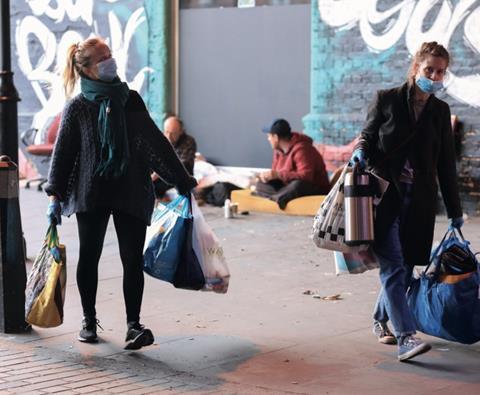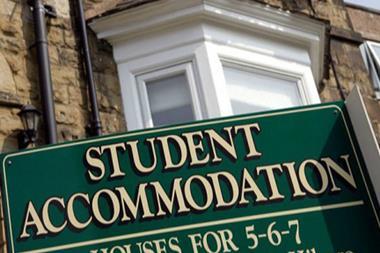After a series of lockdowns in the UK, there is more reason than ever for impact investors to support local frontline charities, writes Ben Rick
Sitting in a home office and trying to remember which day of the week it is will feel to many like Groundhog Day. For many other people living in precarious housing, it means something different – one more day of struggle to stay safe.
The start of the first lockdown found thousands of people sleeping rough or without permanent housing; they were stuck. A herculean effort by local communities, supported by central government, quickly found accommodation for 15,000 individuals.
Deserted hotels, hostels and the limited empty housing stock owned by housing associations, the private rental sector (PRS) and third-sector organisations all played a role. But it was not just a roof people needed. Lockdown meant they also lost access to food, clothing, support and care. Across the UK frontline, charities rose to the challenge, supporting these individuals and managing to create pathways back to independent living.
The speed and effort involved was impressive and showed that housing the homeless is not impossible; what is really needed is the will to address the problem head on.
Now, in the third lockdown, we face the same problem all over again. Despite numerous initiatives, the economic crisis caused by the pandemic has created a new wave of homeless people who are unable to isolate safely. Councils that were stretched before COVID will struggle to meet the present demand. Housing associations and residential landlords face tenants affected by 10 months of economic hardship.
Homelessness is about more than bricks and mortar. People become homeless for multiple reasons, including family breakdown, addiction, domestic violence, or being released from prison with no-one to take you in. Without direct support, many will be unable to deal with that personal crisis.
This is where frontline support charities come in. These organisations work mainly with working-age people who need help at a time of crisis to return to independent living. A report last year by the Institute for Public Policy Research (IPPR) called this service transitional supported housing (TSH). It is distinct from supported housing for older people (independent living/sheltered accommodation) or permanent housing for those with disabilities (specialist supported housing), and is a relatively small part of the supported housing market. It is also regularly overlooked and requires specialist staff to deliver quality support.

Government research shows that much of the housing owned by the private-rented sector (PRS) is ‘non-decent’ and that vulnerable people are more likely to be living in it. The IPPR report shows that frontline charities are increasingly managing housing, as well as providing support. They do this to ensure that poor housing quality does not negate the beneficial impact of the support. The only way homeless people will return to independent living in the community is if they have access to decent accommodation and high-quality support services for as long as they need it.
At Social and Sustainable Capital (SASC), we believe the best way to help this happen is to boost the role that charitable landlords play in the housing sector. Like the original, community-based housing associations, these organisations understand local needs because they are themselves local; they have the skills needed to deliver targeted support; and they are motivated by their mission, not by profit.
Eight years of financing the charitable sector has shown us how many charities believe they can deliver stronger outcomes if they own and control the housing they use. They are willing to expand their supported housing service but are not doing so at the scale that the homelessness problem demands. This reflects either a lack of capital or an understandable aversion to the risks that come with conventional mortgage financing.
To address these issues, SASC has devised a unique structure which is neither a mortgage nor a lease. The Social and Sustainable Housing (SASH) fund, launched in 2019, enables charities to buy suitable housing in their local area and manage it for a 10-year period. It gives the charities the benefits of ownership (control, choice, long-term access) while removing the key financial risks that come with a regular mortgage.
A SASH borrower needs to demonstrate it has the operational capacity to buy, refurbish and manage properties for itself. But the loan is made in a way that reflects the reality of providing TSH and our staff provide financial support throughout its life.

For investors, the fund delivers an expected base-case internal rate of return of 6% (mostly income derived from government rent and local authority contracts); and high social impact.
The first lockdown proved that it is possible to bring everyone off the streets. The only way to make a longer dent in homelessness is to ensure quality of housing for this group, as well as support services. Housing stock needs to be shifted out of uncommitted PRS hands and into the control of organisations whose mission is to work with vulnerable groups.
Investors who support that shift will be helping to improve outcomes and having a real impact on homelessness.
Ben Rick is CEO at SASC
Social impact

The COVID-19 pandemic has accelerated the trend for impact investing in real estate, most notably in the area of social and affordable housing. In the UK, a growing number of funds have attracted pension-fund capital. While some of the scale and track record required by institutions was not available in ...
- 1
- 2
 Currently
reading
Currently
reading
UK social housing: Investors should support local frontline charities
- 4
- 5
- 6
- 7































